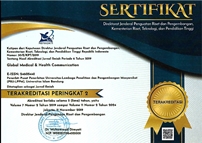Relationship between Knowledge, Attitudes, and Practices of Universitas Mataram Students regarding the Use of Masks on the Occurrence of Maskne
Abstract
Keywords
Full Text:
PDFReferences
World Health Organization. Coronavirus disease (COVID-19) [Internet]. Geneva: World Health Organization; 2020 [cited 2020 September 16]. Available from: https://www.who.int/emergencies/diseases/novel-coronavirus-2019/question-and-answers-hub/q-a-detail/coronavirus-disease-covid-19.
Lake MA. What we know so far: COVID-19 current clinical knowledge and research. Clin Med (Lond). 2020;20(2):124–7.
World Health Organization. Coronavirus disease (COVID-19): masks [Internet]. Geneva: World Health Organization; 2020 [cited 2020 September 18]. Available from: https://www.who.int/emergencies/diseases/novel-coronavirus-2019/question-and-answers-hub/q-a-detail/coronavirus-disease-covid-19-masks.
World Health Organization. Advice on the use of masks in the context of COVID-19: interim guidance, 6 April 2020 [Internet]. World Health Organization. 2020 [cited 2021 Jan 1]. Available from: https://iris.who.int/bitstream/handle/10665/331693/WHO-2019-nCov-IPC_Masks-2020.3-eng.pdf.
Lan J, Song Z, Miao X, Li H, Li Y, Dong L, et al. Skin damage among health care workers managing coronavirus disease-2019. J Am Acad Dermatol. 2020;82(5):1215–6.
Gefen A, Ousey K. Update to device-related pressure ulcers: SECURE prevention. COVID-19, face masks and skin damage. J Wound Care. 2020;29(5):245–59.
Rosner E. Adverse effects of prolonged mask use among healthcare professionals during COVID-19. J Infect Dis Epidemiol. 2020;6(3):130.
Hidajat D. Maskne: akne akibat masker. J Kedokt. 2020;9(3):202–14.
Kosasih LP. Maskne: mask-induced acne flare during coronavirus disease-19. what is it and how to manage it? Open Access Maced J Med Sci. 2020;8(T1):411–5.
Han C, Shi J, Chen Y, Zhang Z. Increased flare of acne caused by long‐time mask wearing during COVID‐19 pandemic among general population. Dermatol Ther. 2020;33(4):e13704.
Techasatian L, Lebsing S, Uppala R, Thaowandee W, Chaiyarit J, Supakunpinyo C, et al. The effects of the face mask on the skin underneath: a prospective survey during the COVID-19 pandemic. J Prim Care Community Health. 2020;11:2150132720966167.
American Academy of Dermatology Association. 9 ways to prevent face mask skin problems [Internet]. Rosemont: American Academy of Dermatology Association; 2020 [cited 2020 December 20]. Available from: https://www.aad.org/public/everyday-care/skin-care-secrets/face/prevent-face-mask-skin-problems.
Duong MC, Nguyen HT, Duong BT. A cross-sectional study of knowledge, attitude, and practice towards face mask use amid the COVID-19 pandemic amongst university students in Vietnam. J Community Health. 2021;46(5):975–81.
Gunawan S, Sinsin I, Zani AYP. Hubungan antara pengetahuan dan sikap dengan perilaku pencegahan COVID-19 pada peserta seminar online STIKes Raflesia 7 April. PPK. 2021;3(1):45–57.
Lestari RT, Gifanda LZ, Kurniasari EL, Harwiningrum RP, Kelana API, Fauziyah K, et al. Perilaku mahasiswa terkait cara mengatasi jerawat. JFK. 2021;8(1):15–9.
Mahmood NF, Shipman AR. The age-old problem of acne. Int J Womens Dermatol. 2017;3(2):71–6.
Limbong J, Kuswinarti K, Sitorus TDR. Knowledge, attitude, and practices towards the COVID-19 pandemic among undergraduate students. AMJ. 2021;8(2):70–6.
Wee EG, Giri MS, Sundram TK, Venudran CV. COVID-19: knowledge, attitude and preventive behaviours of medical and dental students. Int J Biomed Clin Sci. 2020;5(3):236–56.
Larebo YM, Abame DE. Knowledge, attitudes, and practices of face mask utilization and associated factors in COVID-19 pandemic among Wachemo University students, Southern Ethiopia: a cross-sectional study. PLoS One. 2021;16(9):e0257609.
Sherwood L. Fisiologi manusia: dari sel ke sistem. 8th edition. Jakarta: EGC; 2013.
DOI: https://doi.org/10.29313/gmhc.v11i3.11441
pISSN 2301-9123 | eISSN 2460-5441
Visitor since 19 October 2016:
Global Medical and Health Communication is licensed under a Creative Commons Attribution-NonCommercial-ShareAlike 4.0 International License.































.png)
_(1).png)
_(1).jpg)
